|
|
|
Sort Order |
|
|
|
Items / Page
|
|
|
|
|
|
|
| Srl | Item |
| 1 |
ID:
165050
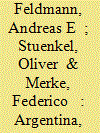

|
|
|
|
|
| Summary/Abstract |
This article examines the role of Argentina, Brazil and Chile (the ‘ABC countries’) in supporting democracy through the logic of consequences and appropriateness in three emblematic cases: the removal of President Zelaya in Honduras in 2009, the constitutional crisis that led to the removal of President Fernando Lugo in Paraguay 2012 and the sudden closing of the National Assembly in Venezuela in 2017. The authors argue that the ABC governments’ responses to governance crises have been shaped by a mixture of motivations, both instrumental (geopolitical interest or ideological affinity) and ideational (a normative preference for democracy). This mixture has resulted in inconsistent policies deriving from the mismatch between the normative commitments made by these countries, enshrined in multilateral instruments such as democracy clauses, which have often limited their room for manoeuvre, and their preference for a measured, prudent foreign policy based upon traditional principles of non-intervention. Specifically, the authors find that the ABC countries’ stance on democracy support depends on two fundamental conditions: their leverage vis-à-vis the target state and the degree of certainty regarding a potential resolution of a given democratic crisis.
|
|
|
|
|
|
|
|
|
|
|
|
|
|
|
|
| 2 |
ID:
147707
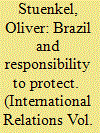

|
|
|
|
|
| Summary/Abstract |
This article questions the still broadly accepted notion that the global debate about Responsibility to Protect (R2P) is divided into a Western (or Northern) ‘pro-R2P’ camp and a non-Western (or Southern) ‘anti-R2P camp’. In the same way, the relatively broadly accepted assertion that R2P is a Western concept overlooks the important contributions developing countries have made in the creation of the norm. Brazil’s stance vis-à-vis R2P, analyzed in this article, is a powerful example of this reality, and the country has, in the past years, temporarily assumed leadership in the discussion about how to strengthen the norm. Paradoxically, Brazil’s move was widely seen as obstructionist. This points to a broader bias that tends observers not to grant non-Western powers the same agency in the creation of rules and norms. The ongoing multipolarization will force observers to correct this vision, as countries in the Global South such as China will be increasingly able to ‘act upon’ R2P, a capacity that so far has been reserved for established powers.
|
|
|
|
|
|
|
|
|
|
|
|
|
|
|
|
| 3 |
ID:
100628
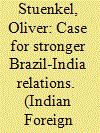

|
|
|
| 4 |
ID:
129873
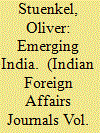

|
|
|
| 5 |
ID:
128742
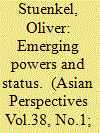

|
|
|
|
|
| Publication |
2014.
|
| Summary/Abstract |
Why did the leaders of four very different countries-Brazil, Russia, India, and China-decide to hold a summit in 2009 in Yekaterinburg, thus transforming "the BRICs" from a financial category into a political grouping? I argue that the main driver for the first summit to take place and succeed was to strengthen each member country's international status. The 2009 BRICs summit was successful in that it led to the birth of a political platform during highly unusual international economic and political circumstances. In a global economy in the midst of a recession and widespread uncertainty, the BRICs' relative economic stability and capacity to respond to the crisis was decisive and lent credibility to their call for reform of the international system. The United States' temporarily reduced legitimacy also provided a window of opportunity for emerging powers to act as aspiring guarantors of stability in tomorrow's world. While measureable gains from cooperation and stronger rhetoric that delegitimized the global order did occur in the following years, they were not the primary drivers for the first summit to take place and succeed.
|
|
|
|
|
|
|
|
|
|
|
|
|
|
|
|
| 6 |
ID:
125440
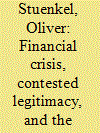

|
|
|
|
|
| Publication |
2013.
|
| Summary/Abstract |
The rise of the BRIC grouping (Brazil, Russia, India, China) is one of the most commented on phenomena in international politics of the past year. Yet little is known about how and why institutionalized cooperation between the BRIC countries began. This article makes two arguments. First, an unprecedented combination in 2008- a profound financial crisis among developed countries, paired with relative economic stability among emerging powers- caused a legitimacy crisis of the international financial order, which led to equally unprecedented cooperation between emerging powers in the context of the BRIC grouping. The BRIC countries were able to use their temporarily increased bargaining power to become agenda setters at the time -culminating in the international Monetary Fund quota reform agreed on in 2010. This shows that even short periods of reduced legitimacy in global governance can quickly lead to the rice of alternative institution - such as, in the case of the crisis that began in 2008, the BRIC platform- which now forms part of the landscape of global governance . Second, intra-BRIC cooperation in the area of international finance enhanced trust among the BRIC countries and led to a broader type of cooperation in many other areas, suggesting the occurrence of spillover effects. Intra-BRICS cooperation (Brazil, Russia, India, China, South Africa) is therefore likely to continue, even after the condition that facilitated its genesis- the crisis in the West- have disappeared.
|
|
|
|
|
|
|
|
|
|
|
|
|
|
|
|
| 7 |
ID:
121763
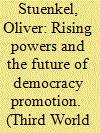

|
|
|
|
|
| Publication |
2013.
|
| Summary/Abstract |
The dominant position established powers have traditionally held in global affairs is slowly eroding. One of the issues profoundly affected by this process will be democracy promotion, an area traditionally dominated by the USA and Europe on both the policy and the academic level. While several rising democracies-such as Brazil and India-may seem, from a Western point of view, to be ideal candidates to assist the USA and Europe in promoting democracy in a 'post-Western World', emerging powers like these are reluctant to embrace the idea. What does this mean for the future of democracy promotion once the USA's and Europe's international influence declines further?
|
|
|
|
|
|
|
|
|
|
|
|
|
|
|
|
|
|
|
|
|